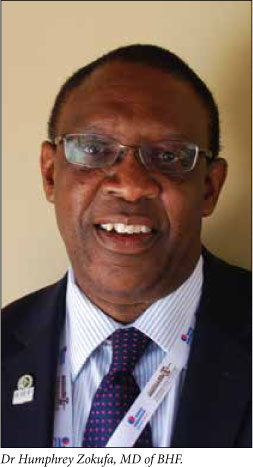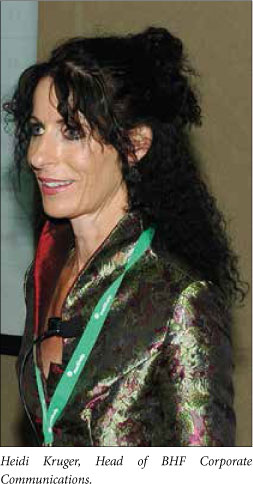Serviços Personalizados
Artigo
Indicadores
Links relacionados
-
 Citado por Google
Citado por Google -
 Similares em Google
Similares em Google
Compartilhar
SAMJ: South African Medical Journal
versão On-line ISSN 2078-5135
versão impressa ISSN 0256-9574
SAMJ, S. Afr. med. j. vol.102 no.11 Pretoria Jan. 2012
IZINDABA
BHF 'upset but undeterred' by Appeal Court ruling

Until the Health Professions Council of South Africa (HPCSA) comes up with acceptable tariff guidelines or the courts definitively rule on the validity of regulations governing prescribed minimum benefits (PMBs), internecine warfare in the healthcare industry is set to continue.
That is the effect of last month's dismissal by the Supreme Court of Appeal (SCA) of an application by the Board of Healthcare Funders (BHF) to have declared invalid a year-old finding by the High Court in Pretoria. In November last year, Judge Cynthia Pretorius found that the BHF had no locus standi1 to ask for a ruling on the correct interpretation of Regulation 8 of the Medical Schemes Act. She ordered that the BHF pay what will amount to several million rands in costs for senior counsel representing 13 respondents, which included the Council for Medical Schemes (CMS), the National Minister of Health, the Pharmaceutical Society of South Africa, Medi-Clinic SA Ltd, Multiple Sclerosis South Africa, National Renal Care and the South African Medical Association. That hefty legal bill must now be paid and, Izindaba reliably learns, there is a high probability that the BHF will change tack and make yet another court bid, this time challenging the legal validity of Regulation 8 - so problematic is it to their members.
Application 'fatally defective'
In the original court case Judge Pretorius said there was merit in the CMS's contention that the 'non-joinder' of all medical schemes in papers submitted by the BHF (it cited only 15 of the claimed 75 members) rendered the application fatally defective. She said all medical schemes should have been joined as the judgement would have a direct impact on them all (both the Medical Schemes Act and its Regulations refer to all medical schemes in South Africa).

A court ruling on the gaping chasm in the interpretation of Regulation 8 would bring to an end a four-year dispute between the BHF, which represents most medical schemes, and the CMS - the regulatory supervisor of private healthcare financing. The conflict ramped up in a test case in November 2008 when the CMS's Appeal Board ruled that service providers must 'pay in full' all invoices related to the costs of providing healthcare services for PMBs - without taking the rules of the respective medical scheme into consideration. These rules significantly diminish their liability and, argues the BHF, are fundamental to the future existence of its member schemes.
In a testy response to the SCA ruling, Dr Humphrey Zokufa MD of the BHF, asked why the other respondent organisations in the court hearing had not had their locus standi questioned, claiming the ruling set a 'severely negative' precedent for other major industry representative organisations wishing to act on behalf of their members, such as the Chamber of Mines, BUSA (Business Unity, South Africa) and SANTACO (the South African National Taxi Council).
Significance of issue underrated by courts: Zokufa
'We'd like to believe that we operate in a country where constitutional rights are taken seriously and the justice system is fair. However, we do not feel that this case has been given the necessary significance to demonstrate fairness by the courts. We therefore consider it our duty to explore ways of taking this matter forward in a responsible and constructive way, as we have done in the past,' he said.
Izindaba interviews with players in the saga revealed that it is unlikely the BHF will take the SCA ruling to the Constitutional Court, given that Judge Pretorius found the section relevant to locus standi in the Constitution inapplicable in her judgement.
BHF spokesperson Heidi Kruger said that if the HPCSA had managed to set maximum tariff guidelines which 'everybody agreed on, it would allay many of the current problems. But the history of Regulation 8 is that the CMS says medical schemes have to pay whatever the doctor charges.
It amounts to open-ended liability.' In the current uncertain climate, doctors charge whatever they choose while medical aids pay doctors out at their own (medical aid) rates, leaving the patient to make co-payments or negotiate the doctor's tariff downward.
Without tariff guidelines, litigation 'the only way' - BHF
Kruger told Izindaba that there had been 'no option' but to take the matter to the SCA. 'We had to take it to its ultimate end. Now we're weighing up the best way to take the issue forward. While there is no tariff we must pursue legal options. The HPCSA tariff process must include one universal coding and tariff system for the entire industry, one that is fair and affordable for all.'
Asked what she and Zokufa meant by 'exploring legal options' and 'taking the matter forward', she declined to rule out either an approach to the Constitutional Court or 'another application on Regulation 8', confirming that the latter would probably test the regulation's legal validity.
In August this year, shortly after a BHF conference where speakers set the healthcare industry alight, the HPCSA issued a set of what SAMA labelled 'highly unscientific' low-ceiling tariff guidelines. They caused a furore among doctors, forcing the council back to the drawing board. A multi-stakeholder HPCSA committee probing the real costs of healthcare and coding issues is being touted as the best way to come up with a more realistic set of tariff guidelines - but until then the BHF has vowed to forge ahead with court action.
Basic distrust between funders and providers
In an exclusive interview with Izindaba at the BHF conference which ended in the Drakensberg on 1 August, Zokufa was asked about PMBs and the 'free for all' on tariffs in the absence of 'consensus' guidelines.1 He drew an analogy with companies manufacturing car parts but 'having acrimony' with car makers themselves. 'They come up with a good product for my car. We decide on what is a good price. You survive and I survive. That's not happening in this industry.' He said that once the legislative framework for taking care of 8.2 million lives was set up, the industry failed to create an environment in which funders and providers saw each other as 'being on the same side of the same coin, all targeting the patient'. The basic underlying problem included an absence of trust between funders and providers and a lack of transparency in the system. 'Maybe healthcare has been steered too much to the commercial side of it ... commercialism in health is then run along the lines of how people run a corporate business. I think we've gone overboard. There is a line in the sand that must not be crossed. I don't think we know where that line is . I don't think medical schemes and providers are sensitive to where that line is. It's what drives the lack of trust,' he added.

This is one money-driven soap opera that, like the TV drama Dallas, will run and run, especially as it tries to tap into opportunities and/or adapts to threats posed by the country's biggest-ever oil well - National Health Insurance.
* locus standi - the ability of a party to demonstrate to the court sufficient connection to and harm from the law or action challenged to support that party's participation in the case.
Chris Bateman
chrisb@hmpg.co.za
2. Bateman C. Private healthcare 'lost line in the sand'- Zokufa. S Afr Med J 2012;100(10):776-777.[http://dx.doi.org/10.7196/ SAMJ.6253]














